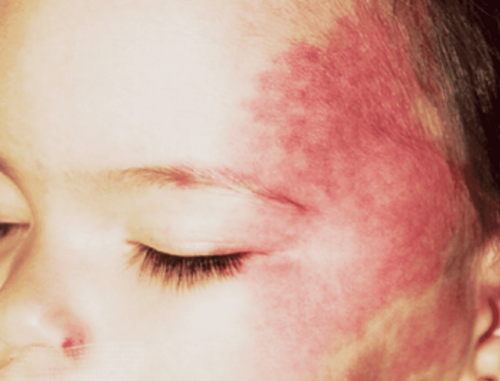This is an automatically translated article.
You might think that diagnosing precocious puberty is simple. If your 6-year-old daughter seems to be growing breasts or your 7-year-old son has hair under his arms. However, in reality, many factors are needed to diagnose precocious puberty in children.
1. What is puberty?
Puberty is the time when children develop physically and emotionally into boys and girls. Usually, this begins to happen in adolescence:
In girls, the average age is 10. In boys, the mean age is 11.
2. What is precocious puberty?
Precocious puberty are physical signs of a child developing too early. This includes breast growth, pubic hair, and voice changes. These are called secondary sex characteristics. Precocious puberty occurs before age 8 in girls and before age 9 in boys. Most children with this disorder grow up quickly at first. But they also stop growing before reaching their full genetic height potential.
3. What causes early puberty?
It can be caused by tumors or tumors that develop on the ovaries, adrenal glands, pituitary gland or brain. Other possible causes include central nervous system problems, a family history of the disease, or certain rare genetic syndromes. In many cases, the cause of the disorder cannot be found. There are two types of precocious puberty:
Dependent on gonadotropins: This is also known as central precocious puberty. This is the most common type of precocious puberty. Most girls and half of boys with precocious puberty have this pattern. Puberty is initiated by the early release of hormones called gonadotropins. In girls, precocious puberty may be caused by premature maturation of the hypothalamus, pituitary gland, and ovaries. But in most cases, the cause cannot be found. Gonadotropin-independent: This is a form of precocious puberty that does not begin with the release of early gonadotropins. Instead, it is caused by the premature release of high levels of sex hormones. These include male hormones and female hormones.

Có nhiều nguyên nhân gây ra tình trạng dậy thì sớm ở bé gái 7 tuổi
4. Who is at risk of precocious puberty?
A child is at risk of precocious puberty if he or she has any of the following signs:
Tumors or growths on the ovaries, testes, adrenal glands, pituitary gland or brain Nervous system problems central Family history of disease A rare genetic syndrome.
5. Diagnosis of Precocious Puberty
There are two types of precocious puberty. The more common form is central precocious puberty. This is when the brain begins the normal process of puberty triggering the release of various hormones but it comes on early. In most cases, there is no known reason. Very rarely, central precocious puberty has a medical cause, such as an infection or growth in the brain.
Peripheral precocious puberty, less common. It usually develops when there is an overproduction of sex hormones from a cyst or a tumor.
To diagnose precocious puberty, your child's doctor will ask some questions and run some tests. These may include:
A physical exam to check for any changes in the body Family history to find out if precocious puberty can run in families Blood tests to check for your hormones child and sometimes thyroid level X-rays, usually of the hand and wrist, to check the child's bone age; this is a way to know how quickly they grow and whether final adult height may be affected. Brain MRI is sometimes used to rule out medical problems that can cause central precocious puberty, like tumors. MRI is not routine for most children. They are used when the underlying cause is more likely, such as in children younger than 6 years old or children with other symptoms. Ultrasound: An example of the ovaries may be helpful in some cases.
6. Treatments for Precocious Puberty
For central precocious puberty, medications called GnRH analogues are the standard treatment. They work by blocking the hormones coming from the pituitary gland that trigger puberty. Most children who need treatment receive these drugs as injections or implants:Monthly injections into the muscle or daily injections just under the skin. Implants are tubes slightly longer than an inch that are placed under the skin, usually in the upper arm. They gradually release the drug into the body. Nasal sprays are used daily.

Dậy thì sớm ở bé gái hầu hết được điều trị bằng tiêm hoặc cấy ghép các chất tương tự GnRH
GnRH analogues work quite well. During the first month of treatment, the signs of puberty can actually become more apparent. But then they disappear. In girls, breasts will shrink after 6-12 months of treatment. In some cases, they almost disappeared.
Side effects from GnRH analogs are usually mild. These include headaches, menopausal symptoms (such as hot flashes), and abscesses at the injection site. The evidence to date shows no long-term adverse effects with the use of GnRH analog.
Other treatments for central precocious puberty include:
Progesterone: Progesterone injections used to be the standard treatment for central precocious puberty. They are less effective than GnRH analogues. Surgery and radiation therapy may be needed in cases of central precocious puberty caused by a brain tumor. Removing the tumor does not always resolve all symptoms. These treatments will delay puberty for as long as your child takes them. So how long does central precocious puberty treatment last? It depends on the individual child and how well they are growing. After treatment is started. monitoring takes place every 1-3 months. Response to treatment varies with age at onset. Some studies have suggested that children receive no treatment beyond the age of 11 years.
Treatment of peripheral precocious puberty is quite different. It depends on the cause. In some cases, surgery may be needed to remove a tumor or cyst from an ovary or testicle. Medicines can help in some cases.
7. How can parents help?
Give your child a simple, honest explanation of what is happening. Explain that these changes are normal for older children and teenagers, but their bodies start developing too soon. Inform your child about the treatment and what to expect along the way.
Also, look out for signs that teasing or other problems may be affecting your child's emotional well-being. Common warning signs to discuss with your doctor include: Poor grades, problems at school, loss of interest in daily activities, depression
How a parent's reaction may affect the child's level of coping. To promote a healthy body image and strong self-esteem:
Avoid commenting on your child's appearance. Praise achievements in school or sports. Support your child's interests. It's important that your doctor can treat precocious puberty. They can help children maintain their potential for height into adulthood and limit the emotional and social stress that children may experience as an early adult. Pediatrics Department at Vinmec is one of the few multi-specialty hospitals with a full range of doctors specializing in neurology, cardiology, gastroenterology, nutrition, psychology, endocrinology, and hepatobiliary care, helping to quickly and promptly handle the disease. detect diseases during the examination. As a key area of Vinmec Medical system, Pediatrics Department always brings satisfaction to customers and is highly appreciated by industry experts with:
Gathering a team of leading pediatricians: including leading experts with high professional qualifications (professors, associate professors, doctorates, masters), experienced, worked at major hospitals such as Bach Mai, 108.. Doctors All are well-trained, professional, with a mind - range, understanding young psychology. In addition to domestic pediatric specialists, the Department of Pediatrics also has the participation of foreign experts (Japan, Singapore, Australia, USA) who are always pioneers in applying the latest and most effective treatment regimens. . Comprehensive services: In the field of Pediatrics, Vinmec provides a series of continuous medical examination and treatment services from Newborn to Pediatric and Vaccine,... according to international standards to help parents take care of their baby's health from birth to childhood. from birth to adulthood Specialized techniques: Vinmec has successfully deployed many specialized techniques to make the treatment of difficult diseases in Pediatrics more effective: neurosurgery - skull surgery, stem cell transplantation. blood in cancer treatment. Professional care: In addition to understanding children's psychology, Vinmec also pays special attention to the children's play space, helping them to have fun and get used to the hospital's environment, cooperate in treatment, improve the efficiency of medical treatment.
Please dial HOTLINE for more information or register for an appointment HERE. Download MyVinmec app to make appointments faster and to manage your bookings easily.













